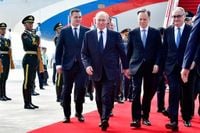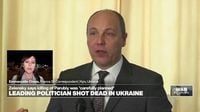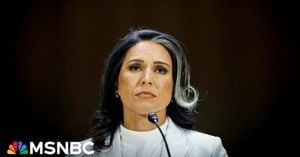The western Ukrainian city of Lviv was rocked on Saturday, August 30, 2025, by the brazen assassination of Andriy Parubiy, a former speaker of Ukraine’s parliament and one of the country’s most prominent political figures. The daylight killing has set off a manhunt, reignited fears of targeted attacks against Ukrainian leaders, and fueled speculation about Russian involvement amid the ongoing war.
According to reports from TVP World and corroborated by the National Police of Ukraine’s official Telegram account, the shooting occurred shortly after noon local time. Parubiy, 54, was gunned down by an assailant who fired seven or eight shots from an electric bicycle. The shooter, described as wearing a helmet and a backpack emblazoned with a courier company’s branding, sped away from the scene, leaving authorities scrambling to track him down. The hunt for the killer continues, with police urging the public to come forward with any information.
President Volodymyr Zelensky was quick to address the nation, calling the assassination a “horrendous murder.” In a statement posted to X (formerly Twitter), Zelensky extended his condolences to Parubiy’s family and vowed, “All necessary forces and means are engaged in the investigation and search for the killer.” As reported by FRANCE 24, Zelensky’s condemnation was unequivocal, emphasizing the government’s determination to bring the perpetrator to justice and ensure such violence does not undermine Ukraine’s democratic institutions.
But who was Andriy Parubiy, and why has his death sent such shockwaves through the country? Parubiy’s career was marked by his steadfast commitment to Ukrainian independence, democracy, and European integration. Born in 1971, he rose to national prominence during the Revolution of Dignity protests from 2013 to 2014, which ultimately ousted President Viktor Yanukovych and set Ukraine on a westward path. Parubiy played a pivotal role in organizing and leading those protests, earning a reputation as a tireless advocate for reform and sovereignty.
Following the revolution, Parubiy was appointed secretary of Ukraine’s National Security and Defense Council in February 2014—the very month Russia annexed Crimea. He held that post until August of the same year, navigating the country through one of its most perilous periods. Later, from April 2016 to August 2019, Parubiy served as speaker of Ukraine’s parliament, the Verkhovna Rada. In that role, he championed legislation aimed at strengthening Ukraine’s ties to the European Union and cementing democratic reforms.
Parubiy also led the European Solidarity Party and was widely recognized as a staunch defender of Ukraine’s parliamentary system. His legislative efforts included co-authoring a controversial language law intended to make Ukrainian the sole official language of the country—a move seen by many as a bulwark against Russian influence. According to Polish state news agency PAP, Parubiy had recently been working on this legislation alongside fellow MP Mykola Kniazhytskyi.
The reaction to Parubiy’s assassination has been swift and emotional, both within Ukraine and among the global Ukrainian diaspora. Paul Grod, president of the Ukrainian World Congress, issued a heartfelt statement: “Andriy Parubiy embodied the spirit of Ukrainian resilience and the pursuit of democracy. His legacy will live on in the hearts of all who fight for freedom and justice. We express our solidarity with his family and with all who are mourning this devastating loss.”
In the immediate aftermath, suspicion has inevitably fallen on Russia, though no official claim of responsibility has been made. Ukrainian politicians have been forthright in their accusations. Mykola Kniazhytskyi told PAP, “This was clearly a Russian assassination. The Russians are trying to intimidate Ukrainians and to eliminate anyone who consistently defends Ukraine’s independence.”
This sentiment is echoed by political analyst Yevhen Mahda, who told Polish state media, “Russia did this—there’s no question. Judging from Russian social media, their goal is to destabilize Ukraine as much as possible and to show they are all-powerful, capable of murdering people who defend national interests and democracy.” As of this writing, Russia has not commented on Parubiy’s death, nor has it taken credit. However, the context is hard to ignore: in a recent interview with NBC’s “Meet the Press,” Russian Foreign Minister Sergey Lavrov reiterated that protecting the cultural heritage and language of ethnic Russians in Ukraine was a top priority when Moscow launched its full-scale invasion in February 2022.
The killing of Parubiy is not an isolated incident. In July 2024, another Ukrainian MP, Iryna Farion, who had worked on similar language legislation, was also shot and killed outside her home in Lviv. According to TVP World, these attacks have deeply unsettled the political class and raised fears of a coordinated campaign to eliminate pro-European, pro-reform lawmakers.
The method of Parubiy’s assassination—using an electric bicycle for a quick escape, the disguise as a courier, and the precision of the attack—has led some security experts to speculate about a highly professional operation, possibly with foreign backing. The symbolism of targeting a leader so closely associated with Ukraine’s resistance and democratic aspirations is not lost on observers, especially as the country continues to fend off Russian aggression on multiple fronts.
For ordinary Ukrainians, the murder is a chilling reminder of the risks faced by those who dare to challenge entrenched interests and foreign interference. The city of Lviv, long regarded as a bastion of Ukrainian culture and resistance, is now grappling with the reality that even its most secure streets are not immune to violence.
As the investigation unfolds, the Ukrainian government has promised transparency and thoroughness. Zelensky’s administration has repeatedly assured the public that no effort will be spared in apprehending the killer. Yet, as history has shown, such high-profile assassinations often leave more questions than answers, and the specter of political violence continues to loom over Ukraine’s fragile democracy.
In a country where the struggle for independence and self-determination is ongoing, the loss of Andriy Parubiy is more than a personal tragedy—it is a national wound. The coming weeks will test Ukraine’s resolve, not just to find justice for Parubiy, but to defend the democratic ideals for which he stood.





